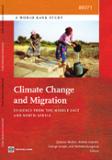Climate Change and migration: evidence from the Middle East and North Africa
 Climate change and migration are major concerns in the Middle East and North Africa region, yet the empirical evidence on the impact of climate change and extreme weather events on migration remains limited. Information is broadly lacking on how households in vulnerable areas perceive changes in the climate, how they are affected by extreme weather events, whether they benefit from community and government programs to help them cope with and adapt to a changing climate, and how these conditions influence the decision of household members to migrate, either temporarily or permanently. Climate Change and Migration: Evidence from the Middle East and North Africa provides a dozen papers and an overall synthesis on various aspects of the relationship between the climate and migration. It is based in large part on the results of new household surveys and focus groups undertaken in Algeria, the Arab Republic of Egypt, Morocco, the Syrian Arab Republic, and the Republic of Yemen. The results suggest that households do perceive important changes in the climate, and that many households are being affected by extreme weather events resulting in losses in income, crops, and livestock. The coping and adaptation strategies used by households to deal with weather shocks are diverse, but also limited, with most households not able to recover from the negative impact of weather shocks. The ability of community- level responses and government programs to support households is also very limited. Finally, while climate change is currently not the main driver of migration flows, it does contribute to these flows, with worsening climatic conditions likely to exacerbate future migration flows.
Climate change and migration are major concerns in the Middle East and North Africa region, yet the empirical evidence on the impact of climate change and extreme weather events on migration remains limited. Information is broadly lacking on how households in vulnerable areas perceive changes in the climate, how they are affected by extreme weather events, whether they benefit from community and government programs to help them cope with and adapt to a changing climate, and how these conditions influence the decision of household members to migrate, either temporarily or permanently. Climate Change and Migration: Evidence from the Middle East and North Africa provides a dozen papers and an overall synthesis on various aspects of the relationship between the climate and migration. It is based in large part on the results of new household surveys and focus groups undertaken in Algeria, the Arab Republic of Egypt, Morocco, the Syrian Arab Republic, and the Republic of Yemen. The results suggest that households do perceive important changes in the climate, and that many households are being affected by extreme weather events resulting in losses in income, crops, and livestock. The coping and adaptation strategies used by households to deal with weather shocks are diverse, but also limited, with most households not able to recover from the negative impact of weather shocks. The ability of community- level responses and government programs to support households is also very limited. Finally, while climate change is currently not the main driver of migration flows, it does contribute to these flows, with worsening climatic conditions likely to exacerbate future migration flows.
